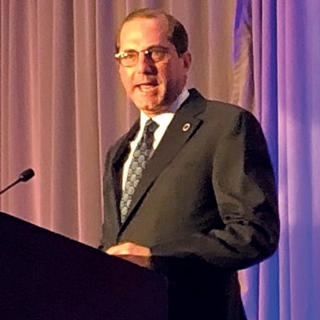
Human and Human Services Secretary Alex Azar on Tuesday outlined critical areas of focus his agency will pursue as it ushers in value-based transformation and a new wave of graying Baby Boomers approaches retirement.
He identified two distinct groups of boomers: the leading edge, which has typically moved and changed lifestyle as they aged, and the trailing edge, which is expected to stay closer to family and have higher rates of chronic conditions.
“The shift has occurred in expectations around care for Americans with significant disabilities, also,” Azar said in his remarks, prepared for AHCA/NCAL’s annual Congressional Briefing in Washington. “We want them to spend as much time as possible in their communities and with their family.”
To make ‘lowest-cost appropriate’ settings realistic, Azar says that the government, providers and private payers must focus on maximizing interoperability; improving transparency and quality; testing new payment models; and removing government “burdens.”
“The common thread for these priorities is the recognition that value is not accurately determined by arbitrary authorities or central planners,” Azar said. “This is especially true when it comes to finding long-term care solutions. What makes sense for some patients, what makes the later years of their lives healthiest and more meaningful, or what is the preferred setting for someone with significant disabilities, is not going to be the same for everyone.”
Chief among the new models tested by long-term care facilities will be the new Patient Driven Payment Model developed by the Centers for Medicare & Medicaid Services. Azar reiterated PDPM will reduce paperwork enough to save $2 billion over the next decade.
He said the new system reflects the administration’s belief that the government should not pay providers in ways that drive “overuse of services” but rather pay for quality of patient treatment.
AHCA members met in the nation’s capital Monday and Tuesday in an annually concerted effort to lobby their respective lawmakers.




